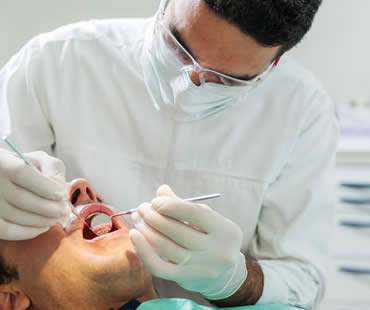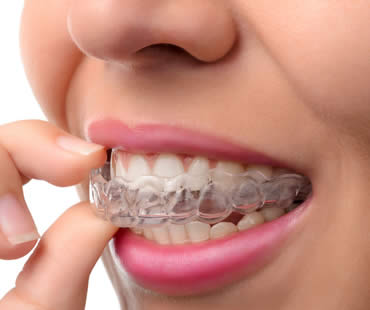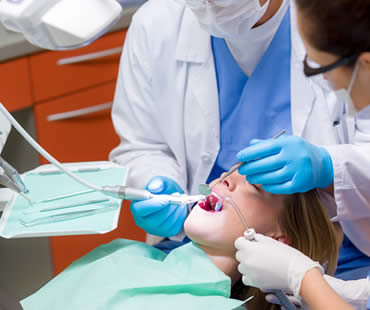
It’s easy to put off a trip to the dentist if you’re not experiencing any pain or noticeable issues. Maybe it’s inconvenient in your busy schedule, maybe you don’t want to spend the money, or maybe you experience anxiety about dental visits. None of these are good enough reasons to forego proper dental care so that you ensure a healthy mouth and attractive smile.
Having regular checkups with your general dentist is important for a variety of reasons. Probably the most beneficial reason is to catch problems early, before they have time to become serious and negatively impact your oral health. Cavities and gum disease are both examples of issues that can wreak havoc in your mouth if left untreated, but if handled quickly they may disappear with as little as a fluoride treatment or change in your hygiene routine. Avoiding treatments like fillings, crowns, or root canals – not to mention the associated costs to your wallet and your schedule – are great reasons to see your dentist every six months!
Another benefit of regular checkups is a brighter, more beautiful smile. Even the best dental hygiene at home can’t reach every bit of plaque or tartar that accumulates on your teeth. Professional cleanings eliminate buildup to give you a more appealing smile, as well as removing harmful and stinky bacteria from your mouth.
Your overall health also reaps the rewards of consistent dental care. Oral problems can impact your general health through things like introducing dangerous bacteria into your body that can spread and cause various health risks. Also, your dentist may notice signs of health issues you might not realize, such as cancers or diseases or nutritional deficiencies.
Make your smile a priority and visit your general dentist regularly. Don’t let excuses get in the way of receiving the rewards dentistry has to offer.
If you need a dentist in Fernandina Beach contact us today

Are you unhappy with your smile? Do crooked, gapped or missing teeth affect you socially and professionally? Do you wish you had received braces as a child? Do you desire a brighter, whiter smile? Have you been dreading some upcoming special occasion, worried about how you’ll look in the photos or in person? If you have any insecurities about your smile, talk to a cosmetic dentist. How you feel about your smile can change.
There are so many “little” reasons to take steps to improve your smile, but you may need a bigger occasion, something very special, to help you take that first step. Is there a class or family reunion coming up? Nothing erases the years like restoring your youthful, attractive smile. Leave them doing a double-take as they realize who you are and how good you look!
Are you about to get married? At no point in your life are you likely to have as many photos taken of you as you will on your wedding day. These photos are often cherished for generations, and should represent the best you possible.
Even occasions like job interviews or first dates can warrant having your smile spruced up. Your smile is a huge part of the first impression you make on the people you meet, and with a brighter, whiter, more even smile, you will meet those people with confidence, unafraid to eat, drink, talk or laugh in public.
Your cosmetic dentist can talk to you about bonding, which allows the dentist to restore the shape of the original tooth using tooth-colored resin composites. Cosmetic contouring reshapes your teeth to correct overlapping, chipped or cracked teeth, and teeth whitening can be used to brighten your smile. Dental veneers can be used to cover gaps, discolored or stained teeth, and missing or broken teeth.
Do you have a mouth full of metal fillings? Your cosmetic dentist can remove this unsightly metal and replace it with a cosmetic filling that matches the surrounding tooth. No one will know you have fillings!
Don’t wait to begin your journey with a cosmetic dentist. You can face that special occasion with confidence and an attractive smile.
Schedule your appointment at our Fernandina Beach dental office

Many patients seeking the stability and durability of dental implants wonder what the difference is between mini implants or standard sized dental implants. The basic differences are with regard to their intended function.
A standard dental implant is larger than 3 millimeters in diameter and is made up of two parts: the screw and the abutment. The screw portion of a dental implant is made of titanium, a non-toxic metal well tolerated by the body. The success of all dental implants is due to this bio-compatibility. Materials that aren’t tolerated by the body can create a response by the immune system and may lead to serious problems over time.
With a standard implant, the screw has two threaded areas: external, to screw into the bone and internal, to accommodate any components that are screwed into the implant for security. This internal area provides for the abutment. It is on this abutment that the tooth portion of a dental implant is attached. It also holds dentures firmly in place.
A mini dental implant is smaller than 3 millimeters in diameter and has one solid piece instead of screw and abutment. A mini implant has a solid screw body with a rounded ball shape that extends out of the jawbone. This rounded ball can hold a denture with a corresponding slot, keeping the restoration firmly in place.
Because they are smaller, mini implants provide less support than a standard implant. For example, four mini implants would be needed to hold a patient’s lower dentures in place securely. For the same job, only two standard sized implants would suffice.
Consult your dentist to determine if mini implants or standard implants are right to address your missing tooth or teeth. Get the right implant for your specific needs.
If you live in the Fernandina Beach area contact us today

Metal braces used to go hand-in-hand with teenage years. Those awkward years were made so much worse with the taunts of “metal mouth” or “brace face.” Today, if your teen is dreading those comments, there are alternatives, particularly Invisalign.
Has your teen been told that braces are a necessity? Is he or she fearful of time spent in metal braces? Invisalign could be the solution, providing an “invisible” way to straighten and align crooked teeth.
Not all teens are suited for treatment with Invisalign. The aligners must be worn diligently, up to 22 hours a day, in order to work properly. Teens may be tempted to remove them more often than recommended, leading to far longer treatment time or ineffectual treatment.
Changes in Invisalign treatment are addressing the specific needs of teens with solutions like the blue dot wear indicator, which allows dentists and parents to determine if the teen is wearing the aligner the recommended amount of time.
Power ridges provide the maximum force necessary to exact complex movements in the mouth, including the movement of tooth roots. Because some teens are still in the process of having their teeth erupt, Invisalign aligners can feature eruption tabs or other design elements for teeth that are still in the process of erupting.
Benefits like these allow Invisalign to cater to a teen’s specific orthodontic needs while still providing all of the things that make Invisalign aligners so popular with patients of all ages.
Invisalign makes it possible to remove the plastic aligners while teens are eating or cleaning their teeth. Metal braces can trap unsightly bits of food, leading to a teen being self-conscious. Oral hygiene habits remain far easier with Invisalign than with traditional metal braces. Flossing takes place normally, while flossing with traditional metal braces is very challenging.
If you have questions regarding whether or not Invisalign or traditional metal braces are right for your individual teen, talk to a skilled orthodontist today. Your orthodontist will determine if Invisalign will be the most effective treatment to address your teen’s orthodontic needs.
Schedule your appointment at our Fernandina Beach dental office

Tooth pain can be one of the most uncomfortable types of pain there is. It can make your whole jaw and head ache, interfere with eating, and cause your teeth to be more sensitive. One common reason for a toothache is your wisdom teeth, which are the molars in the very back of your mouth that develop last. Sometimes they don’t even erupt, but they can still be there under your gums causing trouble. If you experience pain related to wisdom teeth, here are some suggestions.
Make an appointment to see your dentist as soon as possible. This way you can find out for sure if your wisdom teeth are to blame for your pain, and decide the best treatment plan for your situation. A dentist examination, which may include x-rays, is the best way to determine exactly what’s going on with your teeth. You may not even be able to see your wisdom teeth, but they might be growing improperly under your gums. Often, wisdom teeth need to be extracted to avoid continued pain or worsening condition. Luckily, wisdom teeth extraction is a common procedure that your dentist or oral surgeon is very familiar with, and can provide you with great treatment that will end up relieving your pain.
While waiting for your dental appointment, try applying an over-the-counter numbing gel such as Oragel. This may help relieve your pain at least for a short time. Also, taking non-prescription pain medicines should help. Acetaminophen and ibuprofen are both good choices to try, especially to subdue the pain when you want to sleep.
Remember that prevention is often the best way to avoid dental pain. Brush your teeth at least twice a day, and floss every day. See your dentist regularly for checkups, because problems with wisdom teeth can sometimes be spotted before you ever begin to feel any pain associated with them. This allows you to deal with the problem before you have to endure a toothache.
If you live in the Fernandina Beach area contact us today

Sedation dentistry, also known as “sleep dentistry,” refers to the practice of calming and relaxing a patient prior to a dental procedure with the use of pharmacological agents. Sedation dentistry began in the late 1700s when a chemist named Humphry Davy began experimenting with inhaled gasses and first observed the analgesic effects of nitrous oxide, commonly known as “laughing gas,” on himself and on dental patients.
In 1844, an American dentist named Horace Wells used nitrous oxide as a dental anesthetic during the extraction of his own molar tooth. Wells made the observation that while he experienced very little pain while undergoing the extraction, he was still fully conscious during the procedure. A few years later, dentist William Morton and surgeon John Warren performed a public oral surgery at Harvard University, demonstrating the analgesic properties of a sulfur-ether compound, further proving that sedation dentistry should be explored further.
For years, trial and error procedures informed doctors of the safety of various levels of pain-relieving gasses. It was discovered that 100% nitrous oxide, when used in prolonged dental cases, could lead to hypoxia, a condition in which the body is deprived of the oxygen it needs to thrive, something that can eventually lead to death. Finally, a Chicago surgeon named Dr. Edmund Andrews began mixing nitrous oxide with oxygen, administering them simultaneously. This allowed for safer analgesic options for both surgical and dental procedures. Ether and chloroform, combined with some nitrous oxide, was later shown to provide deeper sedation for prolonged treatments.
Intravenous (IV) sedation began in the 1960s at the Loma Linda University School of Dentistry in California. Dentists there experimented with IV sedation for the highest level of management for pain, anxiety and fear for dental patients undergoing surgery.
Today, dentists routinely turn to sedation dentistry for their patients to relieve pain, stress and to provide the most comfortable dental therapies as possible. Talk to your dentist to discover the latest sedation dentistry options and to see how they can help you positively experience your next dental procedure.
If you live in the Fernandina Beach area contact us today







